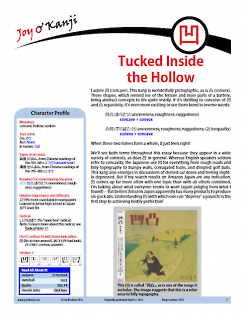凹
concave, hollow; sunken
Kanji 1032
Thank you for visiting this Character Home Page. Below you'll find a synopsis of the essay. If you wish to read the full text, the PDF of the essay is available for purchase to the right.
English speakers rarely refer to concavity, but the Japanese use 凹 in an astonishing variety of ways. They need it when writing about everything from dimpled golf balls, potholes, and cupped hands to inconsistent income and the moon's irregular surface. With 凹, one can also mention cognitive and psychological states. And this kanji is crucial in discussions of both topography and flat abs!
Revision history:
Dec. 15, 2023: Made too many changes to list here, but the most significant is deleting an image on p. 5 because it featured a keyword that I hadn't yet explored! I then deleted that page and renumbered the rest.
Dec. 5, 2023:
- pp. 3 and 5: Fixed broken links.
- p. 6: Slightly changed the translation of the main title of a book.
Sept. 8, 2023: p. 3: Improved the wording of a sentence in the photo caption.
May 19, 2022: p. 3: Made extremely minor edits to the translation of the sign.
Jan. 2 and 3, 2020:
- p. 5: One product no longer seems to exist on Amazon, so I deleted not only the link but also the whole paragraph about it.
- p. 7: Fixed a link in the sidebar.
- p. 11: Simplified the last sample sentence to match how we have it in essay 1590.
- p. 13: Added a link to the Kanshudo games.
Apr. 17, 2015: Originally published.



Comments